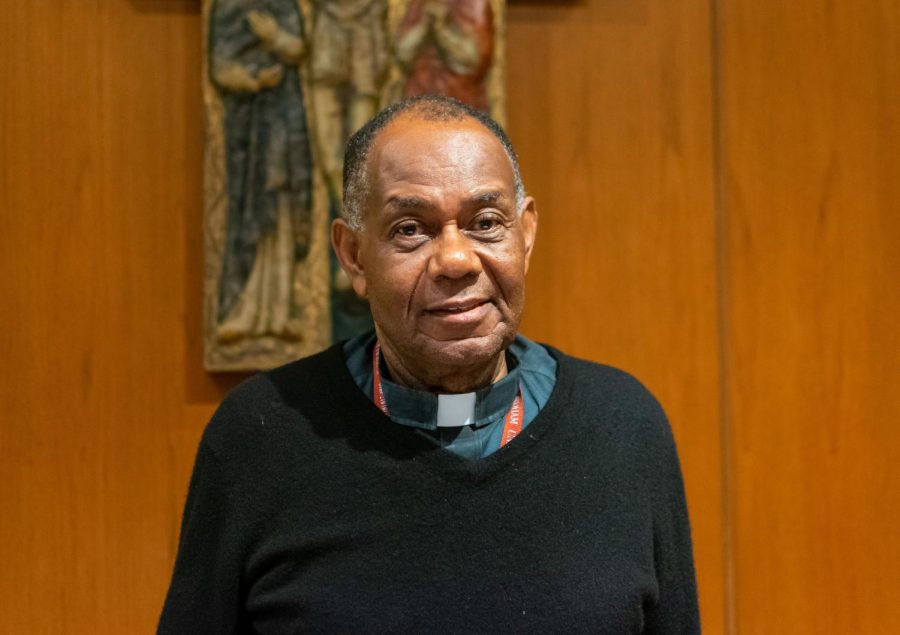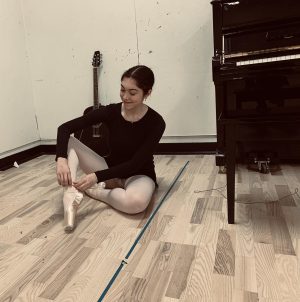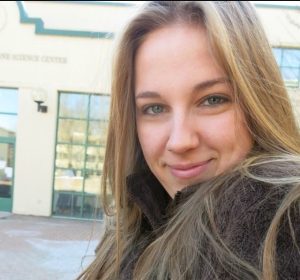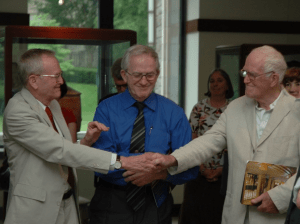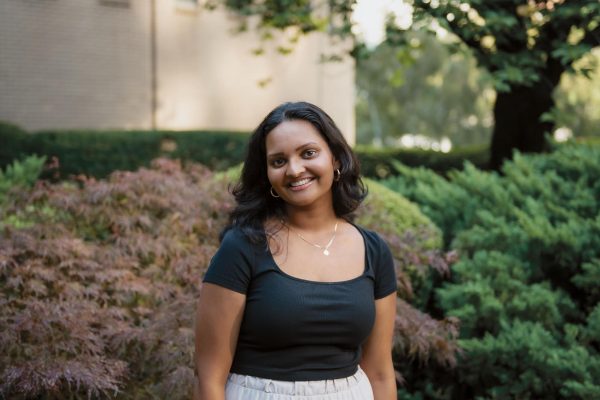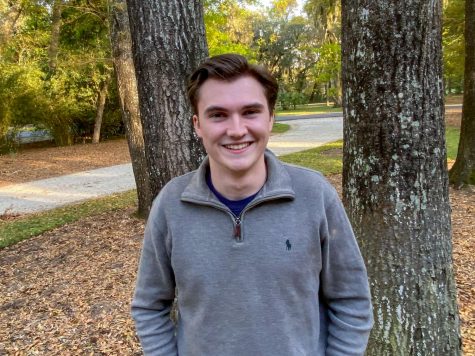George Quickley, S.J., Impactful Former Lincoln Center Chaplain, Dies at 75
Quickley, who also served as a Board of Trustees member, was remembered for his joyful presence, racial advocacy and commitment to loved ones
Quickley was known for his faith in God and his advocacy for others, especially students and staff of color.
January 15, 2022
George Quickley, S.J., a former chaplain at the Lincoln Center campus and Board of Trustees member, died on Nov. 21, 2021. Quickley had suffered from a series of cardiovascular concerns since spring 2021. He was 75 years old.
Director of Campus Ministry at Lincoln Center Erin Hoffman announced Quickley’s death in an email to students and alumni of Campus Ministry on Nov. 22.
“He was a joyful presence in our community whose presence we have already greatly missed since he left Fordham in August 2020,” Hoffman wrote. “This loss is certainly felt by us all and I like to think Heaven is even brighter now that Fr. George there singing his joyful song with the angels.”
Quickley was born on Aug. 12, 1946, in Baltimore, Maryland, to middle-class parents who strove to provide a solid education for their two sons. In 1956, they moved to northern Baltimore, where Presbyterian churches prohibited Black worshippers from attending the services.
Due to this, Quickley began visiting a nearby Catholic church, Blessed Sacrament, one of the few churches that allowed Black attendees. Upon reading a book titled “Obedient Men,” by Denis Meadows, that details a young man’s formation as a Jesuit, Quickley realized he wanted to become a Jesuit. He eventually did so following his high school graduation in 1974.
Quickley attended the University of Maryland at College Park. During his sophomore year, he was accepted into the school’s seminary program and then, two years later, moved onto the Theological College in Washington, D.C.
In 1974, Quickley entered the Society of Jesus. Early in his formation as a Jesuit, he studied philosophy as a graduate student at Fordham Rose Hill in 1977. Quickley was ordained as a priest in 1980.
His growing familiarity with Fordham prompted Quickley to take a position serving as a Jesuit-in-residence at the Lincoln Center campus in 2019.
While a Jesuit priest, Quickley occupied several roles in numerous countries. He served as an assistant pastor at St. Aloysius Catholic Church in Washington, D.C., and he taught subjects such as Latin, theology and English at nearby Gonzaga College High School and Mackin Catholic High School.
From 1989 to 1996, Quickley served as the Catholic chaplain for Lorton Reformatory, a prison system near Lorton, Virginia. His role constituted leading religious services, counseling inmates and prison staff on religious matters, and administering religious activities. Quickley pronounced his final Jesuit vows in 1995 and moved to Nigeria in 1996, where he became the Provincial for the Society of Jesus Northwest Province from 2005 to 2011.
Following his return from Africa, Quickley spent a yearlong sabbatical at Fordham until 2012. As a member of the African Province of Jesuits in West Africa, Quickley was expected to return after his sabbatical. However, he took a position at a church in California for a few years. Then, heart-related health issues preventing him from returning to Africa and his growing familiarity with Fordham prompted Quickley to take a position serving as a Jesuit-in-residence at the Lincoln Center campus in 2019.
“He also loved opera and the arts and thus had an affinity for Fordham’s arts programs, he liked to go to shows and was a big supporter of the Ailey/Fordham dancers.” Erin Hoffman, director of Campus Ministry at LC
Quickley served as chaplain to Lincoln Center until August 2020, during which he advised and counseled students on religion-related inquiries. He lived on campus in McMahon Hall.
Hoffman underscored his compassion and care for students at Lincoln Center, as well as his passion for the arts and appreciation for the Alvin Ailey Dance Program.
“He also loved opera and the arts and thus had an affinity for Fordham’s arts programs, he liked to go to shows and was a big supporter of the Ailey/Fordham dancers,” Hoffman said. “During the early days of COVID-19, when only a handful of students lived on campus, Fr. George offered to buy pizzas for students on Easter.”
“He measured success in terms of quality not quantity and enjoyed getting to know students.” Erin Hoffman
She recalled Quickley’s upbeat attitude, cheerful voice, collaborative spirit and deep spirituality. Hoffman highlighted his authentic and joyful personality and his ability to positively impact the lives of those around him.
“He had a deep spirituality that grounded him and gave him the confidence and humility that fed such a freedom,” she said. “He measured success in terms of quality not quantity and enjoyed getting to know students.”
Quickley’s racial advocacy and presence as a Black Jesuit resonated with BIPOC students, who remarked to Hoffman on how empowering — both spiritually and personally — his service on campus was. She mentioned learning about race and the church, as well as the history of Black Catholicism from him.
“His presence lingers in those memories and in the challenge to be authentic, free, joyful, and grounded as he was.” Erin Hoffman
“It was especially important to him to connect with students (and staff) of color, and he really wanted to work with more Black students on campus to help create a more inclusive community,” she said. “I’m saddened that we won’t have more conversations nor will he greet us with his song and smile, but his presence lingers in those memories and in the challenge to be authentic, free, joyful, and grounded as he was.”
Carol Gibney, director of campus ministry, solidarity and leadership, commemorated him as a “kind, gentle, faith-filled, and amazing soul.”
She emphasized his racial advocacy, remembering a moment in the aftermath of Trayvon Martin’s death in which he discussed the tragedy of Martin’s murder, his own lived experience in the United States as a Black man, and the repeated racial profiling he endures while attending Mass.
Gibney described his “thick faith that he wore like a comfortable shawl,” infectious joy and powerful voice, with which she imagines him “singing with the choirs of all the angels in heaven.”
“He was the nicest person anyone could ever be, and I’m not just saying that because he’s my cousin.” Marya Bosley, cousin of Quickley
Marya Bosley, Quickley’s younger cousin, reflected on her memories of him, such as the eulogy he delivered at his father’s funeral, as well as his officiation of her marriage.
“He was the nicest person anyone could ever be, and I’m not just saying that because he’s my cousin, it’s because that’s truly who he really is and was,” she said.
Bosley believes that his presence encouraged her to become a more understanding, patient and humble individual, with Quickley representing the glue that held the family unit together. She also recalled his humorous nature and storytelling skills.
“He baptized all of us and married all of us, he was a jack of all trades and master of all,” she remarked.
She described him as “one of the greatest people you could ever have met,” and cited his style of speech and profound way of talking as one of his most cherished attributes. Bosley mentioned that his commitment to his faith and alleviating the suffering of others inspired her to be a nun.
In regard to his lasting legacy, both in terms of career and personal achievements, she characterized him as the “best of the best and the best cousin to me.”
Quickley is survived by his nephew, William Spencer, and cousins. A wake was held on Tuesday, Nov. 30, 2021, and a memorial Mass was celebrated on Wednesday, Dec. 1, 2021, both at St. Charles Borromeo Church in Harlem. Quickley was buried at the Jesuit cemetery in Wernersville, Pennsylvania, on Dec. 2, 2021.

